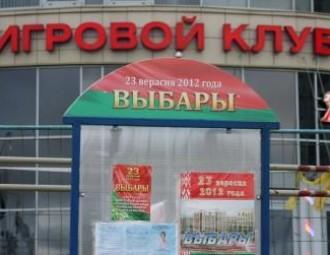Will Belarusan NGOs’ leaders go to the polls?
 Peradvybarny_agitacyiny_stend
Peradvybarny_agitacyiny_stend
On the eve of the parliamentary elections, many are wondering, whether or not to go to the polls? We decided to address it to the representatives of various Belarusan public organizations.
Reporter of EuroBelarus Information Service addressed to a number of NGOs’ representatives to know whether they are going to go to the polls for the upcoming parliamentary elections and what do they justify their actions with.
Miraslau Kobasa, chairman of the Enlightenment Public Association “Lew Sapieha Foundation”:
- I am not going to go to the polls, because the situation of the last 8-10 years has demonstrated that, firstly, this is not an election, but some kind of parody. Herewith, there are different reasons for such an opinion, ranging from procedures for candidates’ nomination and ending with the rights of election observers, etc. In short, there are a lot of issues which I do not accept.
And secondly, what is our parliament, what are its plenary powers, what is its activity? Let me see, if I remember correctly, it has recently approved only one bill at the initiative of the deputies, and all the rest has come from the Presidential Administration.
Andrei Kazakevich, director of the Institute for Policy Studies “Palіtychnaya sphera" (Political Sphere):
- I will go to the polls, but I’ll probably vote against all, depending on how the situation would emerge in my constituency: whether the people for whom it is possible to vote will be admitted to the election and if they will remain on the ballot.
I just think that, rather than not to participate, it is still better go to the polls, and even just to spoil the ballot, because such actions would complicate by the authorities the task of forgery.
Dzianis Melyantsou, senior analyst at the Belarusian Institute for Strategic Studies (BISS):
- I'm not going to the polls, because I will be out of Belarus at that time. But, even if I would have been in the country, even then the chances for my participation in the elections would be little. And the point is not even in my convictions. My constituency is in Mogilev, and I live and work in Minsk. So I hardly would have committed such a feat, go to Mogilev just to go to the polls.
Enira Bronitskaya, director of the Office on the Rights of Persons with Disabilities:
- I will not go to the polls. I see no sense in it. During my observer experience I have seen too many things. During the last election, for example, there was a kind of picture: election commission even counted all the votes, as appropriate, and then they closed their room and wrote completely different data. Moreover, the Parliament is an absolutely dead structure, and votes haven’t been really considered in this country for a long time.
- I will observe the elections; see if anything has changed in that sense. Most probably, there will be no changes in the election process. But I will observe just to not to lose skills in this area.
At my polling station, I will not go there for several reasons. Firstly, because our Parliament does not solve anything: during their activity time, the deputies have put forward only one bill. Therefore, we can say that it is not the legislative body. Secondly, we all know that the votes are not considered, and it also doesn’t help promote coming to the polls.
Ulad Vialichka, chairman of the International Consortium "EuroBelarus":
- I am not going to go the polls as far as there is no such institution like the elections in our country. And the ritual throwing of ballots into ballot boxes is not an option; therefore, I do not see any sense in such rituality. Thus, as long as election processes doesn’t’ solve anything in the country, I will not go to the polls.
-
03.01
-
07.10
-
22.09
-
17.08
-
12.08
-
30.09








































